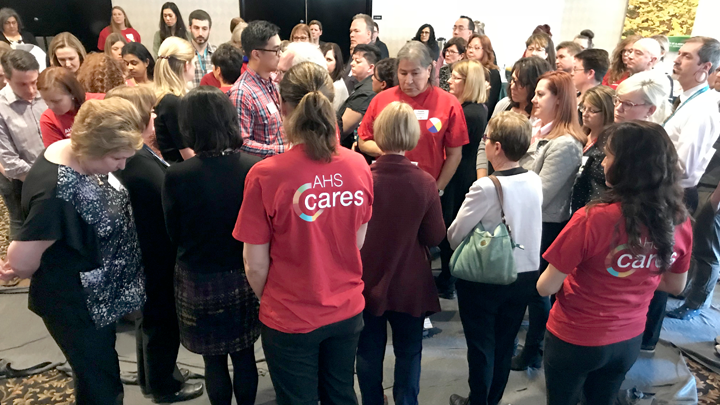
August 17, 2018

Participants from the University of Alberta Hospital, Stollery Children’s Hospital, Mazankowski Alberta Heart Institute and the Kaye Edmonton Clinic took part in a day-long course focused on truth and reconciliation with the Indigenous peoples of Canada, where they were invited to step into the roles of First Nations, Inuit and later Métis peoples.
Story & photo by Sharman Hnatiuk
EDMONTON — An impactful, day-long course focused on truth and reconciliation with the Indigenous peoples of Canada recently attracted 150 leaders from the University of Alberta Hospital (UAH), Stollery Children’s Hospital, Mazankowski Alberta Heart Institute (MAHI) and Kaye Edmonton Clinic.
This learning opportunity reflected the wishes of two Senior Operating Officers — Cathy Osborne of the UAH, MAHI and Kaye, and Christine Westerlund of the Stollery — who extended an invitation to their colleagues.
The duo first participated in a blanket exercise with Dr. Verna Yiu, AHS President and CEO, and other senior leaders from around the province last year — and came away with a desire to share the experience with their managers, staff, physicians and partner foundations throughout the campus.
“In honouring the truth and reconciliation recommendations, the blanket exercise is a way of educating individuals about the history of First Nations, Metis and Inuit people, and understanding the trauma they have gone through,” says Sherri Di Lallo, Indigenous Child Health Nurse Coordinator for the Stollery, who helped facilitate the session.
In the exercise, blankets are arranged on the floor to represent land. Participants are then invited to step into the roles of First Nations, Inuit and later Métis peoples. The exercise explores Canada's relationships between Indigenous and non-Indigenous people. At the completion of the exercise, participants move into facilitated groups to speak about the experience and what they could do as an ally for Indigenous peoples.
Beforehand, each participant is required to complete three Indigenous Awareness and Sensitivity eLearning courses. The online sessions provide an opportunity to learn about the history of Indigenous peoples, including the legacy of residential schools, treaties, Indigenous rights and law as well as the contributions of First Nations, Inuit and Métis peoples to Canada.
One participant, Corey Chaba, Patient Care Manager for general internal medicine at the UAH, says she now has a better understanding of the generational trauma experienced by Canada’s Indigenous peoples.
“It provided a fantastic background for some of the health issues we see among our indigenous patients,” said Chaba.
Feedback from the sessions has been extremely positive. While the sessions proved extremely emotional for some participants, Di Lallo stresses that the blanket exercise is not designed to make participants feel guilt or shame.
“The bottom line? The blanket exercise is about truth,” adds Di Lallo.
“It’s there as part of Canada’s history. The intent is not to create guilt. Through truth and reconciliation we educate and create awareness. Acknowledging the truth and healing will help us move forward.”
Editors note, story updated August 29, 2018